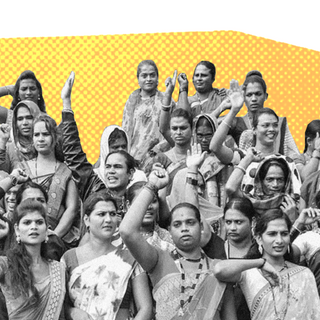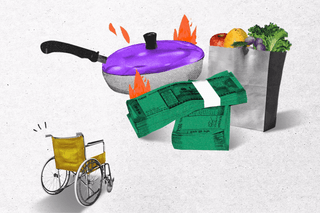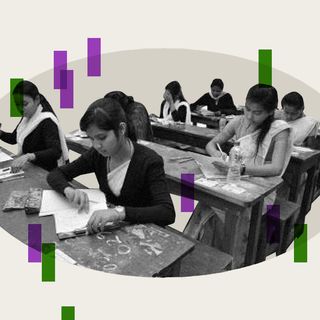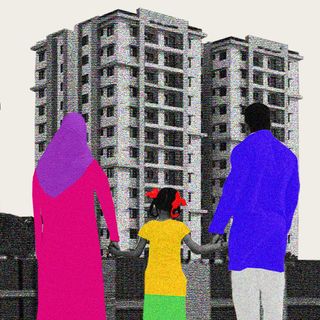
How Society’s Fixation on Independence as a Universal Goal Excludes Disabled, Chronically Ill People
In our obsession with independence, we often forget that human beings have always been part of communities — thriving and surviving through support and cooperation.

“Society sees independence in everyday tasks and living life as an end goal rather than a way of life that people can [choose to] accept or reject,” says Daksh*, 24, who lives with spastic diplegia cerebral palsy.
The mental health and self-worth of disabled, neurodivergent, or chronically ill people, like Daksh, are often severely impacted by society’s glorification of the able-bodied, neurotypical idea of “independence” – self-sufficiency across domains of earning a livelihood, living by oneself, traveling alone, among other things. Holding different people to the same standard without accounting for their individual differences, makes our cultural fixation on independence – often portrayed as a modern outlook – rather ableist.
“[Living alone] has mostly been a good experience, yet sometimes I feel the burden of having to rely on myself in a world that valorizes independence,” writes Srinidhi Raghavan, who lives with fibromyalgia. She recalls an instance when she tried to cook for herself — except, by the time she was done cutting vegetables, she was in so much pain that she lay down to rest and fell asleep. “In my dream, I was walking around a huge supermarket looking for cut-up veggies and fruits when I overheard a couple talking nearby: ‘Why would anyone buy cut-up vegetables and fruits? Can you not do the basic task of cutting it yourself?’… I wanted access to assistance that would help me live an independent life but, even in my dreams, ableism haunted me.”
Rather ironically, in striving for independence as a universal goal, an individual’s right to independently choose how to live their lives, is forgotten.
Referring to news reports on disabled individuals “getting their driving licenses, learning to draw with their feet, singing for a living,” Daksh says: “[W]hen we disabled people watch them with our abled family and friends, we hear passing remarks about how we have to work hard and overcome our disability, too, so that we can learn to live life independently. I have even received forwarded WhatsApp videos from my father, which have inspiration porn, with him adding that even I should try to be independent as much as possible.”
Related on The Swaddle:
Why Disability Activists Argue Against Labels Like ‘Differently Abled’
This social conditioning to aspire for independence also often pushes people to burn out in a bid to achieve it and, consequently, not feel like a burden to others in this hyper-independence-preaching world. “I learned about the ableism behind independence-focused rhetoric the hard way… One of the abusive patterns in my family was the constant push to be independent. This was true even when I was healing from a physical injury that prevented me from working and spurred a year-long breakdown,” wrote Dominique Chatterjee, a disabled individual.
Despite recognizing the drawback of the narrative, though, Chatterjee admits to “still fall[ing] into patterns of obsessing over self-sufficiency.” Netflix’s Atypical, too, shows how the protagonist Sam, an autistic character, initially refuses the accommodations his college provides in an endeavor to prove he’s self-sufficient. However, unable to keep up with constantly changing class schedules, rules that force him to take down rapidly dictated notes by hand despite his apparent discomfort and his inability to keep up with the pace of dictation, and classes that require him to travel across a vast, crowded campus multiple times a day, he begins to lose sleep and burns out. It is only when he is injured and on the verge of a meltdown that he finally agrees to avail of disability services. Despite being fictional, Sam’s tryst highlights the consequences of internalizing the able-bodied definition of independence.
“It is presumed on our behalf that the goal for our lives should be as much independence as possible with as few supports as possible, including accommodations and services,” notes Lydia X.Z. Brown, an autistic disability rights activist.
Instead of independence, then, interdependence is something many disability activists advocate for. And it isn’t a radical, new-age concept. Interdependence is what sustains the economy and, by extension, the supposedly independent individuals within it. How many of us grow the coffee beans that make their way into our mugs each morning? Do we know many writers who manufacture the paper they write on or build the laptops they type into? Is everyone single-handedly constructing the houses they live in? These examples might sound like hyperboles, but that’s because certain forms of interdependence — like the ones listed above — are normalized by the privileged, majoritarian society that can’t function without them.
“In a world built entirely around [their] thought processes, movements, and physical and emotional needs, it will obviously seem as though most able-bodied and/or neurotypical people can live ‘independently’ without visible or conscious support despite the reality that supports for people with typical abilities and neurologies do exist and are simply naturally embedded in all aspects of society and culture,” Brown argues. Naturally, then, disabled interdependence – where the “dependence” stands out to able-bodied onlookers – doesn’t enjoy nearly the same degree of empathy, or even acceptance.
Related on The Swaddle:
Why We Expect People With Invisible Disabilities To Learn To Act ‘Normal’
Painting a picture of what disabled interdependence looks like, Raghavan writes, “I was once walking next to my dear friend and colleague… We were heading towards the breakfast hall when I felt myself go weak in the knees. We stopped and I began to lean on her to hold me up. Through a process of mutual assistance, we walked forward. Me leaning on her for support; she turning to me for direction.” From an able-bodied perspective, the lack of independence, here, might be unsettling, but as Raghavan notes, “[T]his is not an uncommon sight in the community… What the world sees as lack, the community see[s] as [an] opportunity.”
Caught in our obsession with independence, we often tend to forget that human beings, in general, have actually always been part of communities — thriving and surviving through support and cooperation and deriving a sense of wellbeing and belongingness through human connection. After all, it takes a village to raise a human. “Being overly self-sufficient may lead one away from opportunities to exchange ideas, receive inspiration, and deepen relationships — all interactions that foster growth,” wrote Amy Smith, a clinical psychologist in the U.S. “[B]y choosing to isolate in order to feel self-reliant, they may put themselves at risk of feeling unsupported or depressed [and] suffer significant social and professional costs.”
Moreover, not only is the form of hyper-independence idolized by society ableist, but it’s also unhealthy for everyone — including neurotypical and able-bodied populations. Hyper-independence is actually a form of trauma response in human beings — not something one must aspire to emulate. As a result of being hurt or neglected in the past, hyper-independence can manifest as taking on more responsibilities than one can handle while refusing help from others. It, basically, serves as a mechanism to protect oneself from disappointment by denying others the power to disappoint. In doing so, though, one often ends up struggling with intense feelings of loneliness, as Simone Saunders, a trauma therapist, points out.
Adopting an interdependence model could thus benefit not just disabled people, but everyone else — by incorporating the spirit of community as central to the human experience. As Mia Mingus, a renowned disability justice activist, stated: “Interdependence moves us away from the myth of independence, and towards relationships where we are all valued and have things to offer… Interdependency is both ‘you’ and ‘I’ and ‘we’. It is solidarity, in the best sense of the word. It is inscribing community on our skin over and over and over again.”
Devrupa Rakshit is an Associate Editor at The Swaddle. She is a lawyer by education, a poet by accident, a painter by shaukh, and autistic by birth. You can find her on Instagram @devruparakshit.
Related


Assam Govt Is Suspending Internet Services to Prevent Cheating in Exams
